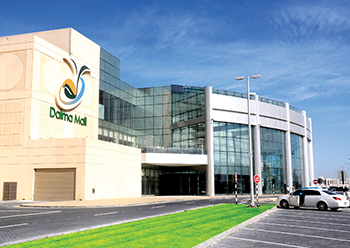Dalma Mall showcases green benefits of chillers
01 December 2020
New heating, ventilation and air-conditioning (HVAC) technologies are disrupting the traditional methods of cooling while offering a more sustainable use of energy.
“The advent of smart connected chillers will, no doubt, continue to drive growth in the market by providing improved performance and reliability along with sustainability,” Luay Ghussein, Senior Director Engineering of Taqeef, a leading air-conditioning solutions provider in the Middle East, tells Gulf Construction.
The chiller market in the UAE alone is projected to reach $186.4 million by 2024, advancing at a compound annual growth rate (CAGR) of 5.9 per cent in a forecast period 2019–2024, according to market research company P&S Intelligence.
Given the rising demand, chiller efficiency has been ever-improving thanks to the introduction of variable speed adjustment capacity and the use of technologies such as variable frequency drives (VFD) and inverters. Large-capacity chillers are being developed which means cooling larger areas is becoming more affordable and friendlier to the environment. It’s now feasible to cool even bigger districts with even smaller machines, which means smaller plant areas, and reduced infrastructure costs, Ghussein points out.
One of Taqeef’s early success stories is Dalma Mall which showcases the measurable benefits of effective chiller use. One of the largest malls in Abu Dhabi, the 255,000-sq-m establishment boasts 425 regional and international retailers, a 14-screen cinema hub, a 6,300-slot car-parking provision, and an on-site hospital, making it an iconic development in the capital’s hospitality, entertainment, retail and healthcare segment.
The challenge
The mall’s original designs and plans included an advanced cooling system featuring a secondary chilled water loop connected to four energy thermal stations (ETS). This relied heavily on an external district cooling supply to deliver cold water to the ETS at 5.5 degrees C with a return of 14.5 degrees C, according to Ghussein.
“When the external district cooling suppliers were unable to provide the cold water supply, the mall development team faced a complex problem. The only identified solutions to the issue involved building an on-site district cooling plant on land that had already been allocated for hotel development. The financial and business implications of this would have been immense,” he remarks.
The solution
Taqeef’s engineering and technical teams integrated the HVAC development plans and devised an efficient, simple and cost-effective solution. The proposal was to fit a cooling plant inside the mall premises that would free up the on-site real estate for the planned hotel and save over Dh100 million ($27.2 million) in projected civil work, design and infrastructure costs (including land opportunity costs).
By specifying high-efficiency Midea chillers, Taqeef was able to deliver the same cooling efficiency as a district cooling plant within a tight budget and short time frame, Ghussein states.
“Working with the developers LLC, and design company DC Pro, Taqeef was able to configure the optimal plant room layout, including ETS and control connectivity. The ultimate solution consisted of five 2,000-tonne Midea super-high efficiency two-stage centrifugal chillers, equipped with full falling film heat exchangers. The compact design of the chillers made them ideal for the restricted space within the plant room. It also showcased a low-noise emission which meant the chillers were installed without the need for additional sound treatment for the plant rooms,” he elaborates.
Taqeef’s project was commissioned in September 2015.
Sustainable chillers
The chillers installed in Dalma Mall make up a centrifugal chiller plant, considered as one of the most efficient cooling systems in the world to date. In its first year alone, the plant achieved 15 per cent savings, which is another milestone in this large-scale project, he says.
“In 2018, the plant recorded an average efficiency of 0.82 kilowatts (KW)/tonne of refrigeration (TR) – an improvement of almost 20 per cent in efficiency compared to other similar cooling technology available at the time. This huge reduction in carbon footprint and energy use puts Dalma Mall centre stage in sustainable development in the region,” Ghussein remarks.
The operator has been continuously monitoring the functions (cooling capacity and consumptions) and reports that there have not been significant fluctuations since then.
With chillers evolving at a pace today, the technology is ever more intuitive offering better efficiency in even smaller packages.
“Technological advancements in the new generation of chiller systems means specific project requirements and challenges can be addressed – with the Dalma Mall’s chiller plant being an industry benchmark for this,” Ghussein remarks.
“With World Expo 2020 happening next year as well as other global and regional events rescheduled to 2021, the UAE can anticipate welcoming more large-scale cooling projects. The good news is the technology is readily available, and with the right specification and maintenance, we can transform the energy impact of new projects and utilise new and exciting technology that can meet the needs of the region’s development plans while protecting our planet,” he concludes.
- Building for the future
- Alstom shaping region’s mobility landscape
- Dake Rechsand looks to greening the desert
- Dalma Mall showcases green benefits of chillers
- $1.8bn sustainability projects in Dubai
- Polypipe launches new HDPE drainage solution



